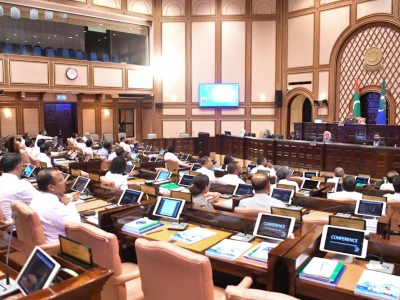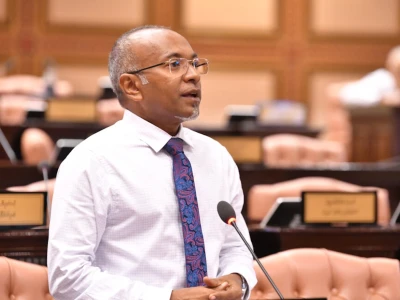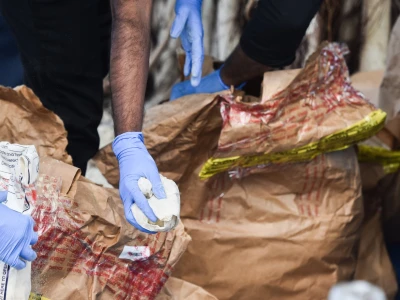
MPs rally against regulation on deporting expat drug traffickers
"There is a lot of blame on the government's head because of this regulation now," said Hassan, who belongs to MDP president Mohamed Nasheed's faction.
Top Stories
By
Mohamed Muzayyin Nazim
Members of parliament on Monday called for amending the regulation that allows foreigners to be deported from the Maldives after they have been caught attempting to smuggle drugs, and the MPs are saying the regulation violates the law.
The lawmakers made the remarks while speaking on an emergency motion moved by MDP MP from Henveiru West Constituency Hassan Latheef in the Parliament on Monday demanding an amendment to the regulation.
Four of the five advocate lawmakers debated the matter. All the members feel that it is illegal and void.
Hassan Latheef, a lawyer, said his intention was to bring to the attention of the government the "vulnerability of this regulation". Thus, he said:
-
Powerful ministers in some countries appear to be trading in drugs; these governments are working with drug networks to gain influence and power
-
Such things are seen in other countries with systematic planning, but he does not wish to see such a scenario during the MDP regime
"There is a lot of blame on the government's head because of this regulation now," said Hassan, who belongs to MDP president Mohamed Nasheed's faction.
One of the concerns of Hassan, who is also a former chairperson of the party, is that he said there is a regulation that allows drug traffickers to be released without any investigation and without even looking at which part of the country they came to do ‘business’ in.
Responding to the claim that such caught foreigners are being sent away so that the state does not bear a financial burden from it, he said, "The State has to bear the costs that incur", and that what they were attempting to curb is far more dangerous.
"The question we need to ask is whether to leave our country as a destination for drug sales/trafficking, or whether to arrest them and speed up the investigation [or] expedite the trial," Hassan said.
"This is a rule that needs to be repealed immediately. I appeal to the government to make this rule consistent with the Narcotic Drugs and Psychotropic Substances (NDPS) Act from today onwards and take legal action against drug traffickers."
Hassan feels that this is a violation of the drugs law and the treaties the Maldives has participated in. He described the regulation as aimed at encouraging drug traffickers.
Vilimale' MP Ahmed Usham – who is also the vice-president of MNP and a lawyer, said that the import and export of drugs to the Maldives (under Sections 112 and 119 of the Narcotic Drugs and Psychotropic Substances (NDPS) Act) is also a legal offence. This has been clarified and laid down in the law and there cannot be a regulation that negates a law, he said.
"Therefore, I do not think it is legally justified to make a regulation [by saying] that something which has been declared an offence in the law is not implemented in such a manner and that it is empowered by another law. I don't think it can be done," said Usham, who had earlier served as deputy attorney general.
One of the clauses mentioned in the making of the regulation is Section 8 of the Immigration Act. Referring to this, Usham said that the clause contains seven categories of people who cannot enter the country and do not include drug traffickers.
"So it is very clear that this regulation is made using a power that is not available under the law," Usham said.
"It is also against the principle of treating all with equality enshrined in the Constitution. I believe that this rule was null and void at the time of its creation."
Kendhoo MP Ali Hussain – a member of the jumhooree party, which is part of the government coalition, said it was not acceptable to make a regulation that defies an existing law. A three-line whip issued by the party's parliamentary group to reject the plea was also criticised, he said, adding that it was also a mistake.
Ali Hussain, who is also a lawyer, said, "Wrongdoing on top of wrongdoing. It makes me wonder just how far these wrongs will go”.
He said the Maldives is called 'Republic of Maldives' and not 'Banana Republic of Maldives'. He added that there were signs that the country was headed to become a "banana republic".
"We [MPs] make it a criminal offence to try to smuggle, traffic and sell drugs into the country. We’ve determined that the person who wants to do it, the person who helps and the person who participates is also committing a criminal offence. But then we make a regulation that says that if the person attempting to smuggle drugs intot he Maldives is a foreigner, travlelling by air, the the foreigner can be sent away without any prosecution. What kind of rule is this, honourable president?" asked Ali, his face a complete mask of disbelief.
"After committing such a low-level act, such a heinous crime, no one in this government, no matter who, no one should be able to escape."
He also demanded that the Parliamentary Committee on Security Services (241) take up the matter as a serious matter.
"I suspect that there are people who want to smuggle drugs into this country under the making of this regulation," Ali Hussain alleged.
According to him:
-
Since this government came to power, 30 drug operations have failed; 21 cases have failed due to problems in the police chain of custody
-
Therefore, the regulation was also framed in a planned manner with a group of people at the bottom of it
Imthiyaz Fahmy, a lawyer and MP from Maafannu North constituency, said the regulations create a "very serious, serious problem".
"The stand set in the case of the smuggler being depoprted is that if the drug could be smuggled into the country peacefully in a way that would not be caught, then the smugglers can get away with it. Even if caught, they can still get away with it," Imthiyaz said.
He demanded that "the regulation should be repealed" as such a stand was being framed. While immigration has the power to deport people coming to the country without entering, it does not have the right to release a person who commits a serious criminal offence so easily, he said.
Opposition-PNC members, who spoke on the issue, also spoke out against the regulation. They also demanded that it be scrapped.
Mohamed Aslam of Hithadhoo North constituency, one of the few lawmakers to speak out against the case, said the current government has not made any illegal regulations. Therefore, he does not think it is the responsibility of parliament to amend the regulation.
"If a regulation has been made illegally, it can be challenged in court. There is space in parliament to amend the rules under the General Rules Act," said Aslam, who is also the leader of the party's parliamentary group.
"I don't believe [and] the parliamentary group leadership doesn't believe that a rule has been made illegally."
Defending the government's decision to frame the regulation, Aslam said, Under this rule, foreigners are sent through special guidelines. Among such people are transit passengers, he said.
"These include, vulnerable people. We have pregnant women. There are people suffering from cancer and AIDS. Very vulnerable people with such serious ailments are used for transporting drugs," Aslam said.
Aslam also highlighted some of the initiatives taken by the present government against drugs. Thus:
-
More than 1.4 tonnes of illicit liquor seized in the last four years
-
1.8 tonnes of illicit liquor has been disposed of




